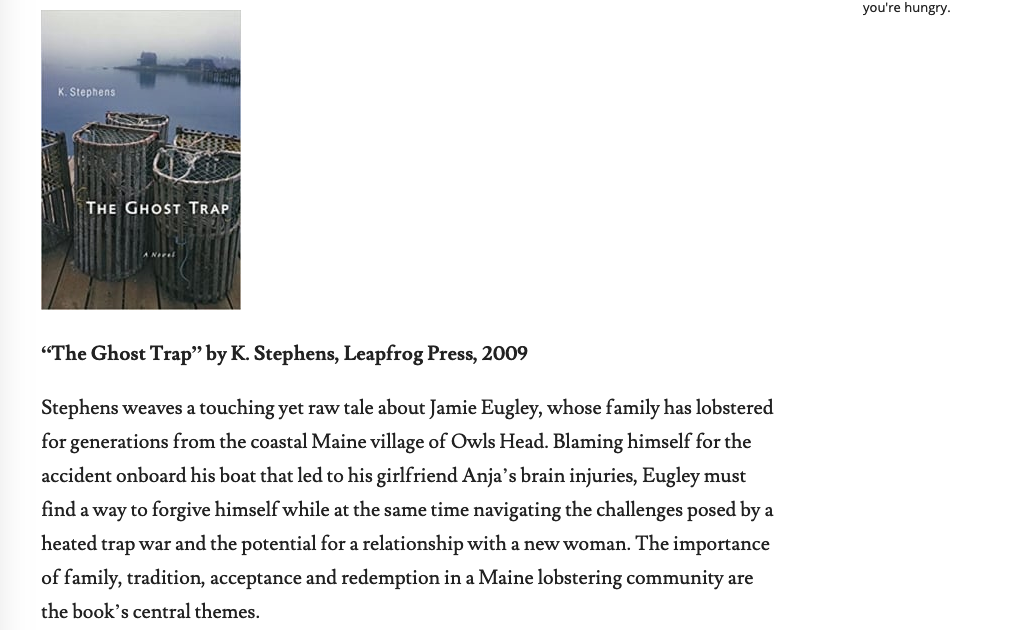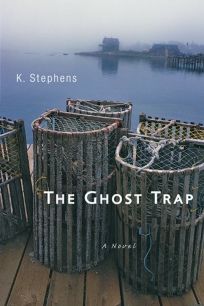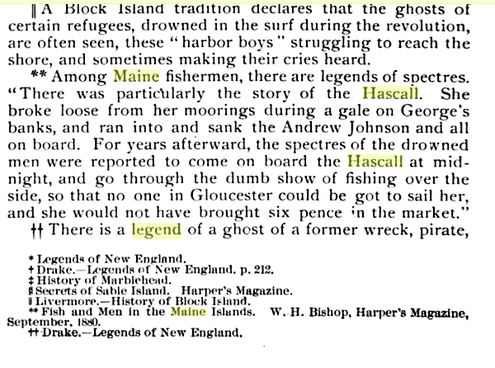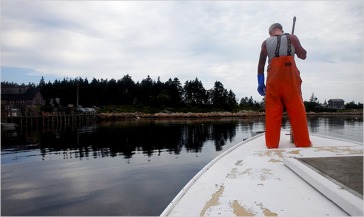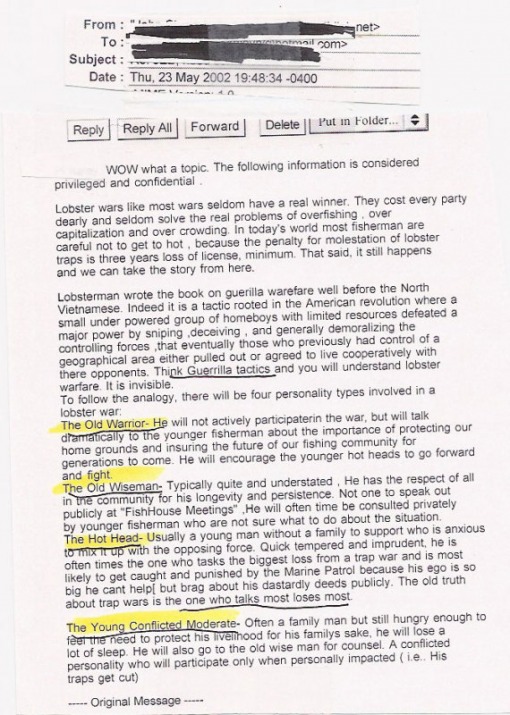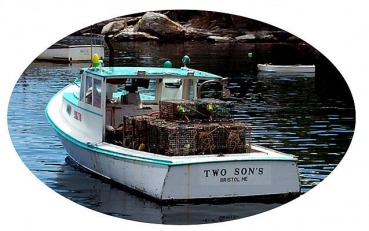Feast on these lobster novels
On August 1, 2021 The Portland Press Herald published a piece on Maine's best lobster novels. Editor’s Note: Given Vinalhaven’s centuries-old tradition of lobstering, we asked Vinalhaven librarian Scott Candage to recommend a few novels about lobstering in Maine. These are his picks, listed in alphabetical order by writer. To read the full story, click here. (Screenshot below due to paywall).
It's official: The Ghost Trap has been optioned into a film.
Ten years after the book was published by Leapfrog Press, The Ghost Trap has been acquired by an L.A.-based production company.
|
Contact:
James Khanlarian 323-496-2601 [email protected] For Immediate Release 12/02/18 Maine author’s lobstering novel The Ghost Trap acquired by Khanlarian Entertainment Los Angeles-based Khanlarian Entertainment has optioned K. Stephens’s 2009 novel, The Ghost Trap. Stephens, a freelance writer in Maine, will be an executive producer on the project, along with James Khanlarian and Peter A. Couture for Khanlarian Entertainment. Stephens’s award-winning debut novel tells the story of Jamie Eugley, a young lobsterman struggling with the grinding responsibilities of a head-injured fiancée and a mounting trap war. Published by Leapfrog Press, The Ghost Trap is a piercingly accurate depiction of life in a small Maine lobstering community. Its publication happened to coincide with a real-life Maine trap war in 2009 that made national headlines. The Ghost Trap will be produced by Khanlarian Entertainment, an independent film company helmed by writer/producer James Khanlarian and producer Peter A. Couture. Kay Stephens was signed on to adapt the novel into a screenplay. ## |
Lobsters and love on the Maine coast
By Susan Mustapich
August 12, 2017 CAMDEN — Four novels about the lives and loves of the men and women who fish for lobster in Maine give us a close look at the place where we live (or visit) through their authors' eyes.
All of the books center around a strong, 20-something character, along with romance and relationships and the business of lobster fishing. In "The Ghost Trap" by local author K. Stephens, "Stern Men" by Elizabeth Gilbert and "The Lobster Kings" by Alexi Zentner, trap wars, seafaring myths and superstitions play important roles in the stories, while in "Hull Creek," by Jim Nichols, the tension centers around a working fisherman and wealthy newcomers who live on the waterfront
All but "The Lobster Kings" are located in fictional settings that closely resemble nearby coastal and island fishing communities and tourist destinations on Penobscot Bay. Zentner's novel takes place on an island near the Canadian border in a setting that resembles Passamaquoddy Bay.
"The Ghost Trap," published in 2009, takes a gritty, realistic look at the life and loves of fisherman Jamie Eugely, who works out in a bay off of small-town coastal Maine. The setting is fictionalized, yet feels like a very real place, right in the Midcoast.
Jamie, who looks for adventure as far from Maine as he can drive, is drawn back to the fishing grounds his family has worked for generations, and is bound to his fiancee Anja by more than a ring. Anja, who suffered a near drowning, struggles to follows steps back to normalcy, in order to reclaim the life and love she can almost remember. The meaning of the "ghost trap" referenced in the book's title, which is open to interpretation, is connected to the circumstances that bind Jamie and Anja to one another, and make their dreams all the more difficult to catch.
In a recent interview, Stephens talked about the meaning of the term "ghost trap," both in general and to her as a writer.
"The ghost trap is a trap cut off at the surface that lies at the bottom of the ocean.That trap can be cut off by a propeller, or can be cut off by a more nefarious means, in an on-the-water conflict in the dead of night," she said. She imagines ghost traps at the bottom of the ocean. "There are lobsters in there, lives in the trap that will never come out."
"The Ghost Trap features a male lead and perspective on relationships and friendships. Stephens has seen the book draw an equal audience of men and women at book signings. She has heard dissatisfaction from female readers about the realism of Jamie and Anja's relationship. "I loved the book, but hated how realistic it was," is one of the comments she gets.
Stephens, who emulates authors Annie Proulx and Caroline Chute in tackling tough topics, said "The Ghost Trap" "is not chick lit. And it's not a chick lit subject by any stretch. The love story is a huge part of this book. There is an enduring love here in this novel, but it is not happily ever after. It's a novel of sacrifice and tenacity and a lot of pain."
"The Ghost Trap" balances the dark, with the light, for the most part. It is filled with lots of local sights and scenes, believable characters including Jamie's friend from childhood Thongchai, life in the bars, restaurants and convenience stores in Jamie's community, and dialog flavored with "elements of funny, lighthearted, bawdy humor."
Stephens was inspired to write her novel back in the 1990s by stories shared by fishermen friends, and was so concerned about accuracy that she had several fishermen read the book before it was published. At the same time, she makes it clear that as an author, she was not trying to come off as a spokesperson for the lobster industry.
"What was really important to me with this book was not only to be very authentic about the working culture of lobstering, but to also pay a little bit of tribute to the mysterious element of the deep that plays into character choices later on," she said.
The deep Stephens refers to is the cold Maine ocean. In her novel, the oxygen, phytoplankton and zooplankton, that make Maine coastal waters appear murky, give life to lobsters and other sea creatures, both real and mythological. Stephens introduces the myth of creatures that live in the sea into the modern world of lobster fishing in a believable manner. Whether selkies are seafaring superstition, or a trick of the eye and imagination caused by the shape shifting ocean, "The Ghost Trap" gives them substance in the place where a lobster boat sits atop the depths of the ocean.
"Hull Creek" is the story of Troy Hull, the last of the fishermen living and working on the waterfront in a town that wealthy visitors have made their home. The reader sees the world through Troy's eyes and thoughts: his boat, his land and dock, his town with all of its features, his friends and foes, and loves lost and found.
Alcohol-fueled adventures, raunchy dialog and a decidedly male perspective are all part of Nichols' storytelling. Yet, as Troy works to put a failed relationship behind him and fight his own insecurities, his story is a realistic view of vulnerability hidden beneath a hardened exterior.
Troy faces the problem of keeping his generational waterfront home and his new lobster boat, when the lobster catch falls off. When he falls behind on a second mortgage he took out to buy the new boat, he finds himself in the middle of relationships with people he doesn't trust, the banker who oversees his mortgage, an old friend and occasional fisherman who needs help transporting drugs, law enforcement and visitors who want more than the average tourist experience.
Will he allow himself to be pushed out of town by people who clearly do not want him there? Will he give in to the anger and hopelessness that fuel desperate measures to make the difficult choices he faces? "Hull Creek" keeps the reader guessing which way Troy will turn, right up to the end.
Gilbert, author of “Stern Men,”published in 2001, creates a body of history around the families who fish off the fictional islands of Fort Niles and Courne Haven, and moves that history forward with the story of Ruth Thomas, the book's protagonist. Ruth is the daughter of a “greedy” lobsterman and a mother who has left the island. Ruth grows up among a Dickensian collection of character's from a jumble of social classes, all thrown together by island life on Fort Niles.
After Ruth's mother Mary leaves the island, her father abandons her to the Pommeroys, a family of seven boys led by matriarch and beauty Rhonda Pommeroy, and her husband Ira, who enjoy drink and one another a little too much. Ruth is perfectly happy growing up with the Pommeroy boys, and occasionally visiting her father, who lives within walking distance. She prefers spending her days with the odd Senator Simon, obsessed with founding a history museum on the island, and his assistant Webster Pommeroy, while resisting the influences of the Ellis family, the richest clan on the island, and her mother Mary's employer. Lanford Ellis, an ancient and reclusive summer resident is the lone representative of the family that once ran a granite company and much of the island. Ruth grows up knowing that her father and other islanders believe her grandmother and her mother were crippled by their devoted service to Lanford's daughter, the demanding Miss Vera Ellis.
As Ruth nears graduation from a private off-island high school paid for by Mr. Ellis, she meets Owney Wishnell, a lobster whisperer and young man her age, and faces the dilemma of shaping her own future. The history of past lobster wars and the threat of a new struggle, her childhood with the Pommeroy family, and the aging Ellis heirs all factor into her ultimate choice.
Alexi Zentner's "The Lobster Kings" embraces magical realism and Shakespearean themes from the play "King Lear" in a story of three grown-up sisters, and their fisherman father, living on Loosewood Island. The family legacy, interwoven with mythical sea creatures who give and then take away, costs their younger brother's life, then their mother's life, and threatens future male heirs to the Kings' fishing territory. Like "Stern Men," the central character, oldest daughter Cordelia, follows her father's lead, while stubbornly making her own way in life.
The Kings are a unique clan, descending from Loosewood Island settler and famous painter Brumfitt Kings. Cordelia and her sisters, and their father and the novel's patriarch, Woody Brumfitt, are college graduates, and Cordelia and her sternman Kenny are also painters.
The adversaries in this novel are the fishermen of James Harbor, where drug dealing and methamphetamine compete with honest, hard work. Cordelia faces violence and worse, her father's failing health and wounds inflicted in childhood, while fishing her own territory, and facing a trap war with an aggressive James Harbor fisherman.
"The Lobster Kings" and "Stern Men" share one of the plot devices common to chick lit. When Ruth first meets Owney, and when Cordelia finds out that Kenny's wife has left him, the reader will know that sex, love and marriage are in the future, and that many chapters will be read before any of that happens.
Courier Publications reporter Susan Mustapich can be reached at 236-8511 or by email at [email protected].
August 12, 2017 CAMDEN — Four novels about the lives and loves of the men and women who fish for lobster in Maine give us a close look at the place where we live (or visit) through their authors' eyes.
All of the books center around a strong, 20-something character, along with romance and relationships and the business of lobster fishing. In "The Ghost Trap" by local author K. Stephens, "Stern Men" by Elizabeth Gilbert and "The Lobster Kings" by Alexi Zentner, trap wars, seafaring myths and superstitions play important roles in the stories, while in "Hull Creek," by Jim Nichols, the tension centers around a working fisherman and wealthy newcomers who live on the waterfront
All but "The Lobster Kings" are located in fictional settings that closely resemble nearby coastal and island fishing communities and tourist destinations on Penobscot Bay. Zentner's novel takes place on an island near the Canadian border in a setting that resembles Passamaquoddy Bay.
"The Ghost Trap," published in 2009, takes a gritty, realistic look at the life and loves of fisherman Jamie Eugely, who works out in a bay off of small-town coastal Maine. The setting is fictionalized, yet feels like a very real place, right in the Midcoast.
Jamie, who looks for adventure as far from Maine as he can drive, is drawn back to the fishing grounds his family has worked for generations, and is bound to his fiancee Anja by more than a ring. Anja, who suffered a near drowning, struggles to follows steps back to normalcy, in order to reclaim the life and love she can almost remember. The meaning of the "ghost trap" referenced in the book's title, which is open to interpretation, is connected to the circumstances that bind Jamie and Anja to one another, and make their dreams all the more difficult to catch.
In a recent interview, Stephens talked about the meaning of the term "ghost trap," both in general and to her as a writer.
"The ghost trap is a trap cut off at the surface that lies at the bottom of the ocean.That trap can be cut off by a propeller, or can be cut off by a more nefarious means, in an on-the-water conflict in the dead of night," she said. She imagines ghost traps at the bottom of the ocean. "There are lobsters in there, lives in the trap that will never come out."
"The Ghost Trap features a male lead and perspective on relationships and friendships. Stephens has seen the book draw an equal audience of men and women at book signings. She has heard dissatisfaction from female readers about the realism of Jamie and Anja's relationship. "I loved the book, but hated how realistic it was," is one of the comments she gets.
Stephens, who emulates authors Annie Proulx and Caroline Chute in tackling tough topics, said "The Ghost Trap" "is not chick lit. And it's not a chick lit subject by any stretch. The love story is a huge part of this book. There is an enduring love here in this novel, but it is not happily ever after. It's a novel of sacrifice and tenacity and a lot of pain."
"The Ghost Trap" balances the dark, with the light, for the most part. It is filled with lots of local sights and scenes, believable characters including Jamie's friend from childhood Thongchai, life in the bars, restaurants and convenience stores in Jamie's community, and dialog flavored with "elements of funny, lighthearted, bawdy humor."
Stephens was inspired to write her novel back in the 1990s by stories shared by fishermen friends, and was so concerned about accuracy that she had several fishermen read the book before it was published. At the same time, she makes it clear that as an author, she was not trying to come off as a spokesperson for the lobster industry.
"What was really important to me with this book was not only to be very authentic about the working culture of lobstering, but to also pay a little bit of tribute to the mysterious element of the deep that plays into character choices later on," she said.
The deep Stephens refers to is the cold Maine ocean. In her novel, the oxygen, phytoplankton and zooplankton, that make Maine coastal waters appear murky, give life to lobsters and other sea creatures, both real and mythological. Stephens introduces the myth of creatures that live in the sea into the modern world of lobster fishing in a believable manner. Whether selkies are seafaring superstition, or a trick of the eye and imagination caused by the shape shifting ocean, "The Ghost Trap" gives them substance in the place where a lobster boat sits atop the depths of the ocean.
"Hull Creek" is the story of Troy Hull, the last of the fishermen living and working on the waterfront in a town that wealthy visitors have made their home. The reader sees the world through Troy's eyes and thoughts: his boat, his land and dock, his town with all of its features, his friends and foes, and loves lost and found.
Alcohol-fueled adventures, raunchy dialog and a decidedly male perspective are all part of Nichols' storytelling. Yet, as Troy works to put a failed relationship behind him and fight his own insecurities, his story is a realistic view of vulnerability hidden beneath a hardened exterior.
Troy faces the problem of keeping his generational waterfront home and his new lobster boat, when the lobster catch falls off. When he falls behind on a second mortgage he took out to buy the new boat, he finds himself in the middle of relationships with people he doesn't trust, the banker who oversees his mortgage, an old friend and occasional fisherman who needs help transporting drugs, law enforcement and visitors who want more than the average tourist experience.
Will he allow himself to be pushed out of town by people who clearly do not want him there? Will he give in to the anger and hopelessness that fuel desperate measures to make the difficult choices he faces? "Hull Creek" keeps the reader guessing which way Troy will turn, right up to the end.
Gilbert, author of “Stern Men,”published in 2001, creates a body of history around the families who fish off the fictional islands of Fort Niles and Courne Haven, and moves that history forward with the story of Ruth Thomas, the book's protagonist. Ruth is the daughter of a “greedy” lobsterman and a mother who has left the island. Ruth grows up among a Dickensian collection of character's from a jumble of social classes, all thrown together by island life on Fort Niles.
After Ruth's mother Mary leaves the island, her father abandons her to the Pommeroys, a family of seven boys led by matriarch and beauty Rhonda Pommeroy, and her husband Ira, who enjoy drink and one another a little too much. Ruth is perfectly happy growing up with the Pommeroy boys, and occasionally visiting her father, who lives within walking distance. She prefers spending her days with the odd Senator Simon, obsessed with founding a history museum on the island, and his assistant Webster Pommeroy, while resisting the influences of the Ellis family, the richest clan on the island, and her mother Mary's employer. Lanford Ellis, an ancient and reclusive summer resident is the lone representative of the family that once ran a granite company and much of the island. Ruth grows up knowing that her father and other islanders believe her grandmother and her mother were crippled by their devoted service to Lanford's daughter, the demanding Miss Vera Ellis.
As Ruth nears graduation from a private off-island high school paid for by Mr. Ellis, she meets Owney Wishnell, a lobster whisperer and young man her age, and faces the dilemma of shaping her own future. The history of past lobster wars and the threat of a new struggle, her childhood with the Pommeroy family, and the aging Ellis heirs all factor into her ultimate choice.
Alexi Zentner's "The Lobster Kings" embraces magical realism and Shakespearean themes from the play "King Lear" in a story of three grown-up sisters, and their fisherman father, living on Loosewood Island. The family legacy, interwoven with mythical sea creatures who give and then take away, costs their younger brother's life, then their mother's life, and threatens future male heirs to the Kings' fishing territory. Like "Stern Men," the central character, oldest daughter Cordelia, follows her father's lead, while stubbornly making her own way in life.
The Kings are a unique clan, descending from Loosewood Island settler and famous painter Brumfitt Kings. Cordelia and her sisters, and their father and the novel's patriarch, Woody Brumfitt, are college graduates, and Cordelia and her sternman Kenny are also painters.
The adversaries in this novel are the fishermen of James Harbor, where drug dealing and methamphetamine compete with honest, hard work. Cordelia faces violence and worse, her father's failing health and wounds inflicted in childhood, while fishing her own territory, and facing a trap war with an aggressive James Harbor fisherman.
"The Lobster Kings" and "Stern Men" share one of the plot devices common to chick lit. When Ruth first meets Owney, and when Cordelia finds out that Kenny's wife has left him, the reader will know that sex, love and marriage are in the future, and that many chapters will be read before any of that happens.
Courier Publications reporter Susan Mustapich can be reached at 236-8511 or by email at [email protected].
Indie Spotlight: Leapfrog PressAuthor: Kate Flaherty |
Mar 12, 2015
Leapfrog Press began in Wellfleet, Massachusetts, in 1993 as the brainchild of writers Marge Piercy and Ira Wood, whose initial goal was providing an outlet for literary fiction overlooked by the big New York houses. While Piercy has served as judge for Leapfrog’s annual fiction contest, the press currently is in the hands of Managing Editor Lisa Graziano and Acquisitions Editor Rebecca Schwab. Now based out of Fredonia, New York—in storied Chautauqua County on the shores of Lake Erie—Leapfrog’s list has moved on as well. In addition to literary fiction by both new and established writers, Leapfrog publishes a smattering of nonfiction and poetry and a diverse list of middle grade and YA fiction.
What makes Leapfrog stand out as an independent press is their refreshing lack of fear when it comes to compartmentalization. Despite publishing a small number of titles per year, they’ve put out everything from mysteries to memoir, science fiction to how-to, hardboiled exposé to tender and poignant story collections. When Leapfrog says they simply want “writing that expands our webs of connection with other humans and the natural world; books that illuminate our complexities,” they really mean it.
For Ploughshares, Lisa Graziano helps readers understand the why and how of their editorial decisions, provides details on Leapfrog’s annual fiction contest (deadline is May 1!) and gives the inside scoop on Leapfrog’s future.
KF: From Mary Malloy’s historical fiction/mysteries, starring adventurous academic Lizzie Manning, whose expertise and mettle could put even Indiana Jones to shame, to Michael Mirolla’s fascinating and frightening sci-fi tale The Facility, where the future is filled with Mussolini clones, to Li Miao Lovett’s powerful novel In the Lap of the Gods, set in China during the controversial construction of the Three Gorges Dam project, Leapfrog’s list is wonderfully quirky. What qualities do your divergent titles share? What marketing challenges does this wide range of titles bring you?
LG: Good storytelling first, and we do like quirky, as you put it. But our books share a few themes to which we are partial. Many have a grounding in science, sometimes subtle, sometimes not. Some are based in important cultural and/or historical questions, whether or not they are “historical.” We don’t perceive these themes as separate. They tend to run together in many our books. You mention Malloy’s novels: Malloy is a professor of history, and she recreates the process of historical research, which involves science, in her novels. Cretaceous Dawn is a time-travel dinosaur adventure—but really a scientific look at what it would be like to hike through late Cretaceous North America.
In other titles, The Ghost Trap shows the reader the culture of Maine lobstermen, in exquisite and often sad detail. In the Lap of the Gods gives us a close-up of the human toll of the world’s greatest engineering project. Dancing at the Gold Monkey shows us the raw hurt of young men back from the Vietnam War. Berlin delves into the philosophical field of logic, twisted up with history. Death My Own Way is a precise psychological allegory about the artist as installation art. We also have a soft spot for dark humor: if you’re into that, check out the authors Vickie Weaver, Michael Graziano, Gregory Hill, Jacob White, Joan Connor, and Dmitri Zlotsky, to name a few. But to us, they are all “Leapfrogian” in their use of history, culture, and science, whatever the plot or the other themes, and whatever the format.
KF: The titles you’ve published as part of Leapfrog’s YA/middle grade fiction list indicate a strong dedication to diversity, both cultural and thematic. What are you most proud of in terms of what Leapfrog provides young readers? What prompted Leapfrog’s foray into the YA arena?
LG: We first published MG in 2008 simply because some wonderful manuscripts came our way, and they are every bit as much “literature” as our adult books. Carlon’s novels about Duke Ellington and Louis Armstrong are unique—thus the support of places such as Jazz at Lincoln Center, and the awards they’ve won. They aren’t simply books about musicians. They are about the culture, the historical context, who these great musicians were as ordinary people, how they were impacted by and dealt with racism, and they’re very much about the music itself. Smelcer’s YA novels of Native Alaskans—stay tuned for Stealing Indians in 2016—are wilderness adventures in the sometimes grim context of cultural destruction and racism. B.B. Wurge’s novels have great lessons for kids about family bonds, scientific investigation, acceptance, and most of all, our wonderful imaginations, which make anything possible—even immortality on the moon.
KF: Your fiction contest guidelines are remarkably broad; Leapfrog will consider submissions of adult, young adult, and/or middle grade fiction in the form of a novel, novellas, or a short story collection. It seems your only strict requirement is a minimum of 22,000 words. How does this flexibility work in Leapfrog’s favor? How does your contest differ from your regular reading period?
LG: Regular submissions are judged on a query letter with synopsis and a short sample, with the author’s publication record as part of the decision. The contest is quite different. An entire manuscript is submitted and read by several judges, and the judging is “blind.” We don’t know anything about the manuscript, since there is no synopsis. We simply read and see where it takes us. The author’s publication record is unknown and therefore not a consideration. And knowing nothing about the theme or plot in advance makes it exciting to open each entry. Sometimes we’re hopelessly caught by the first line, such as these from some of our winners: “One day, the wind blew. It lifted the dust and took it away. The next day was Thursday…” (The Lonesome Trials of Johnny Riles); “This is how bad it’s gotten: I dream about the U.P.S. man.” (How to Stop Loving Someone); “Look. Have you ever tried to right a car you yourself have tumbled?” (Being Dead in South Carolina); “The old family farm is going to drown. . . .You can’t think of anything to do but throw an enormous party.” (And Yet They Were Happy). There are so many more. Others sneak in and quietly grow on us.
The months of reading entries are insanely busy and very special, with a lot of self-inflicted all-nighters. Opening the contest to any book-length work of fiction gives us a huge variety. We don’t want to exclude novellas just because they’re short, or story collections just because they are a harder sell than novels. We simply look for what we think is the best.
KF: What else should writers and readers know about Leapfrog’s future? Upcoming titles? Other contests in the works?
LG: Our next four titles, this summer and fall, are Gregory Hill’s The Lonesome Trials of Johnny Riles, a darkly hilarious Western unlike any you’ve ever read; John Smelcer’s YA novel Savage Mountain; Michael Gutierrez’s The Trench Angel, a historical Western and WWI; and Girl Singer, an adult novel steeped in the Jazz world from Mick Carlon.
Get the best of Ploughshares essays and articles right to your inbox.Powered by OptinMonster
Tags:Fiction Contest, Indie Spotlight, Ira Wood, Kate Flaherty, Leapfrog Press, Li Miao Lovett, Lisa Graziano, Marge Piercy, Mary Malloy, Michael Mirolla, Middle Grade, Rebecca Schwab, young adultRelated Posts
- “She did not let go until her story had been told”: An Interview with Sandy Longhorn
- “Ten Pounds of Potatoes in a 10-Pound Bag”: An Interview with Eileen Pollack
- “All the Leading and Leaping”: An Interview With Kathy Fagan
- What Does Your Liberation Look Like?: In Conversation with Liz Mputu and Justin Phillip Reed
Fisherman found not guilty in criminal threatening trial
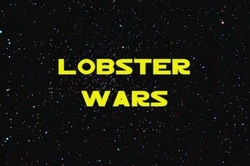
May 15, 2014
Rockland — A Cushing man accused of pulling a gun on another man while feuding over lost fishing gear was found not guilty May 14 by a Knox County jury.
Gary Jones, 52, had been charged with criminal threatening and pleaded not guilty.
The incident, involving two families embroiled in a feud over lobster traps being cut, occurred in October on Muscongus Bay in Cushing.
Authorities were alerted to the altercation by a concerned family member, and were told a gun was involved. Marine Warden Sgt. Rene Cloutier and Patrol Officer Mike Young were told the feud was recorded on a cellphone.
The victim told police he met his younger brother at a wharf in Cushing because several of his brother's traps had been cut. The brothers, along with a sternman, took a vessel out to assess the damage.
The families met on the water at Jones' son's boat, and the victim said Jones pulled out a shotgun and shot at him, according to an affidavit filed in Knox County Superior Court.
Deputy Nathaniel Jack of the Knox County Sheriff's Office assisted and met with Jones and his son at a wharf in Friendship. Jones admitted to pointing a gun at the victim, and said he had been told by the Coast Guard to shoot if he felt threatened, although he denied shooting the shotgun, according to the affidavit. Jones said the brothers had been driving their father's lobster boat "wide-open" at him.
The Jones said they had also lost traps from cutting.
Cloutier, Young and Jack seized a 12-gauge shotgun from Jones and five shotgun shells. The shells were 20-gauge.
According to court documents, a gunshot can be heard in the audio recording of the altercation. A sternman of Jones' present at the scene said he did not remember the gun being fired.
Reprinted from Village Soup
Rockland — A Cushing man accused of pulling a gun on another man while feuding over lost fishing gear was found not guilty May 14 by a Knox County jury.
Gary Jones, 52, had been charged with criminal threatening and pleaded not guilty.
The incident, involving two families embroiled in a feud over lobster traps being cut, occurred in October on Muscongus Bay in Cushing.
Authorities were alerted to the altercation by a concerned family member, and were told a gun was involved. Marine Warden Sgt. Rene Cloutier and Patrol Officer Mike Young were told the feud was recorded on a cellphone.
The victim told police he met his younger brother at a wharf in Cushing because several of his brother's traps had been cut. The brothers, along with a sternman, took a vessel out to assess the damage.
The families met on the water at Jones' son's boat, and the victim said Jones pulled out a shotgun and shot at him, according to an affidavit filed in Knox County Superior Court.
Deputy Nathaniel Jack of the Knox County Sheriff's Office assisted and met with Jones and his son at a wharf in Friendship. Jones admitted to pointing a gun at the victim, and said he had been told by the Coast Guard to shoot if he felt threatened, although he denied shooting the shotgun, according to the affidavit. Jones said the brothers had been driving their father's lobster boat "wide-open" at him.
The Jones said they had also lost traps from cutting.
Cloutier, Young and Jack seized a 12-gauge shotgun from Jones and five shotgun shells. The shells were 20-gauge.
According to court documents, a gunshot can be heard in the audio recording of the altercation. A sternman of Jones' present at the scene said he did not remember the gun being fired.
Reprinted from Village Soup
The Latest Review of The Ghost Trap
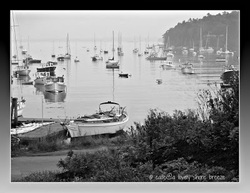
Courtesy A Lovely Shore Breeze
This review is courtesy of Caite, author of the book review blog, A Lovely Shore Breeze. She happens to like books about the sea...here is the link to the full review.
July 25, 2013
Many of us have slightly romantic ideas of Maine..and no, you are not going to take mine away from me.
But we know the reality, like the reality of every place, is a little different.
Lobstering is a hard life, a hard way to make a living. There is the weather, often harsh, the work, back breaking and dangerous. The prices may fall, or the lobsters disappear, but the bills are still due. The boat needs repairs, your friend gets arrested, the lifelong fights with your father go on and on. And there are the trap wars, going back generations, agreements about who can put their traps where, with those that try to push the limits ending up with their gear at the bottom of the ocean..or worse.
But this is Jamie Eugley's life, like his father and his father before him. He is a lobsterman and things are hard. I will warn you, from the beginning you know this story can not have a happy ending. Jamie has not only the daily grind of the work and the sometimes careful dance of dealing with his friends and family and his neighbors, but he also has taken on himself the burden of caring for his brain-injured girlfriend Anja.
He feels responsible for the accident that caused her injury...it will be well into the book when we find out what happened and you can decide yourself how much guilt he should bear...and has taken care of her though the last three years of her painstakingly slow recovery. Perhaps a tiny part of him hopes that someday the beautiful young school teacher, the talented artist he was about to propose to will return, hidden now in the almost child-like Anja he cares for. Maybe the saddest part of the books are our views into Anja thoughts, her own glimpses of clarity, the relentless return of the fog that clouds her days.
Jamie is a loyal man, but as the pressures of work build, as he meets Happy Klein, a mate on a tourist schooner up from Key West for the summer, he dares to glimpse another future, away from his history, away from his responsibilities. But to grasp at it he will have to abandon who he believes he is...and who we come to believe he is.
But hold on, I don't want to paint too grim a picture here. At times the book is very funny, some of Jamie's friends quite amusing. It is a gritty life, with ways too many DUIs, maybe because the local bar is their one refuge but one and all, they are a great cast of characters. I particularly enjoyed the description of a trip up the coast a bit that Jamie takes with one of his friends to a party in Camden. It brilliantly shows us the differences in the worlds of the natives vs. the privileged summer folk, quite entertaining. Stephens, for whom this is her debut novel, has a excellent ear and the dialogue, as in all of the book, is spot on.
These characters will be so real to you, the story so authentic, you will be on the edge of your seat hoping against hope that somehow it will all work our happily for everyone, yet knowing it can not. Personally, I could not put it down, reading it straight through in one day. The ending is just a little heartbreaking, yes. But you will just have to know how it will all play out, so you will happily read on..and maybe shed a few tears at the ending.
Excellent book, highly recommended.
July 25, 2013
Many of us have slightly romantic ideas of Maine..and no, you are not going to take mine away from me.
But we know the reality, like the reality of every place, is a little different.
Lobstering is a hard life, a hard way to make a living. There is the weather, often harsh, the work, back breaking and dangerous. The prices may fall, or the lobsters disappear, but the bills are still due. The boat needs repairs, your friend gets arrested, the lifelong fights with your father go on and on. And there are the trap wars, going back generations, agreements about who can put their traps where, with those that try to push the limits ending up with their gear at the bottom of the ocean..or worse.
But this is Jamie Eugley's life, like his father and his father before him. He is a lobsterman and things are hard. I will warn you, from the beginning you know this story can not have a happy ending. Jamie has not only the daily grind of the work and the sometimes careful dance of dealing with his friends and family and his neighbors, but he also has taken on himself the burden of caring for his brain-injured girlfriend Anja.
He feels responsible for the accident that caused her injury...it will be well into the book when we find out what happened and you can decide yourself how much guilt he should bear...and has taken care of her though the last three years of her painstakingly slow recovery. Perhaps a tiny part of him hopes that someday the beautiful young school teacher, the talented artist he was about to propose to will return, hidden now in the almost child-like Anja he cares for. Maybe the saddest part of the books are our views into Anja thoughts, her own glimpses of clarity, the relentless return of the fog that clouds her days.
Jamie is a loyal man, but as the pressures of work build, as he meets Happy Klein, a mate on a tourist schooner up from Key West for the summer, he dares to glimpse another future, away from his history, away from his responsibilities. But to grasp at it he will have to abandon who he believes he is...and who we come to believe he is.
But hold on, I don't want to paint too grim a picture here. At times the book is very funny, some of Jamie's friends quite amusing. It is a gritty life, with ways too many DUIs, maybe because the local bar is their one refuge but one and all, they are a great cast of characters. I particularly enjoyed the description of a trip up the coast a bit that Jamie takes with one of his friends to a party in Camden. It brilliantly shows us the differences in the worlds of the natives vs. the privileged summer folk, quite entertaining. Stephens, for whom this is her debut novel, has a excellent ear and the dialogue, as in all of the book, is spot on.
These characters will be so real to you, the story so authentic, you will be on the edge of your seat hoping against hope that somehow it will all work our happily for everyone, yet knowing it can not. Personally, I could not put it down, reading it straight through in one day. The ending is just a little heartbreaking, yes. But you will just have to know how it will all play out, so you will happily read on..and maybe shed a few tears at the ending.
Excellent book, highly recommended.
The Ghost Trap-A Powerful Novel
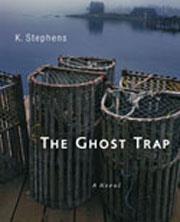
From Maine reviewer George Smith, who often reviews books and novels on the Maine outdoors.
The Ghost Trap is a compelling novel, propelling you along through the deep water, on board Jamie Eugley’s lobster boat of a life, anchored to a brain-damaged girlfriend who nearly died after being swept off the boat and ever-after becomes his burden, with a lobstering father who hates him, a daily life full of beer, boasts, bragging and battles, and friends who seem – well, not so friendly.
Then there is the enemy, family name of Fogerty, better known as the “Drunk Fogertys.” And a newby from away who tries to buy his way into the closed close-knit lobstering culture, by hook and by crook.
I ate up every bit of it, and wished K. Stephens had written a lot more than 326 pages. The author, Kay Stephens, uses her initial on this book to distinguish it from her next nonfiction book. I don’t know what that book is all about, but I can tell you right now I will read it. Kay is a powerful writer with a lot to say.
“Most days he woke up, his body twisted with the kind of ache that made him suck his back teeth before sitting up in the dark.” That’s the first sentence. I could feel that ache. And the darkness beyond.
From trap wars to human tragedies, this is life at it’s grittiest – or it’s best, depending on whether you think lobstering is the best or worst of all possible jobs and life in a small coastal fishing village is paradise or hell on earth. Truthfully, it’s a bit of both.
This novel, published in 2009 by Leapfrog Press LLC, is a sensitive, richly descriptive, haunting story, and it rings true.
On her website, Kay describes herself this way: “I’m a freelance writer with more than 16 years of experience in writing promotional materials for Maine businesses. My niche is the creative economy, artists and entertainers and hospitality venues. It’s not just what you say, it’s how you say it that makes your business memorable.”
All I can tell you is: she can write, and this is one very memorable novel.
To see the review in full go to: www.georgesmithmaine.com
The Ghost Trap is a compelling novel, propelling you along through the deep water, on board Jamie Eugley’s lobster boat of a life, anchored to a brain-damaged girlfriend who nearly died after being swept off the boat and ever-after becomes his burden, with a lobstering father who hates him, a daily life full of beer, boasts, bragging and battles, and friends who seem – well, not so friendly.
Then there is the enemy, family name of Fogerty, better known as the “Drunk Fogertys.” And a newby from away who tries to buy his way into the closed close-knit lobstering culture, by hook and by crook.
I ate up every bit of it, and wished K. Stephens had written a lot more than 326 pages. The author, Kay Stephens, uses her initial on this book to distinguish it from her next nonfiction book. I don’t know what that book is all about, but I can tell you right now I will read it. Kay is a powerful writer with a lot to say.
“Most days he woke up, his body twisted with the kind of ache that made him suck his back teeth before sitting up in the dark.” That’s the first sentence. I could feel that ache. And the darkness beyond.
From trap wars to human tragedies, this is life at it’s grittiest – or it’s best, depending on whether you think lobstering is the best or worst of all possible jobs and life in a small coastal fishing village is paradise or hell on earth. Truthfully, it’s a bit of both.
This novel, published in 2009 by Leapfrog Press LLC, is a sensitive, richly descriptive, haunting story, and it rings true.
On her website, Kay describes herself this way: “I’m a freelance writer with more than 16 years of experience in writing promotional materials for Maine businesses. My niche is the creative economy, artists and entertainers and hospitality venues. It’s not just what you say, it’s how you say it that makes your business memorable.”
All I can tell you is: she can write, and this is one very memorable novel.
To see the review in full go to: www.georgesmithmaine.com
Hey, look who I ran into at the Fisherman's Forum?
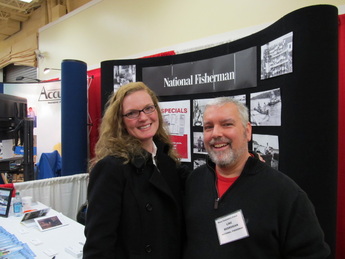
It's not every day you run into the guy who wrote the review on your book. I was at the 38th Annual Maine Fisherman's Forum when I met National Fisherman's Senior Editor, Linc Bedrosian. He reviewed The Ghost Trap back in 2009. See review below. Linc, thank you! See you next year.
Sorrowful Tale Set Against The Backdrop of A Maine Lobstering Community
National Fisherman review
In the time it takes for a lobster trap to spill overboard, lobsterman Jamie Eugley finds his life horribly and irrevocably changed in Maine author K. Stephens's compelling debut novel, The Ghost Trap. Young Eugley finds himself grappling with the grinding responsibilities of caring for his head-injured fiancee Anja, after she is dragged overboard by a lobster trap shooting into the water.
Eugley is also in the midst of trap wars that are escalating dangerously, further ratcheting up the stress level. James Acheson, author of The Lobster Gangs of Maine, praises Stephens for giving readers "an unvarnished view of the subculture of lobster fishermen in small-town coastal Maine."
The story isn't all doom and gloom. Stephens's characters are well drawn and the dialogue is sharp and often humorous. But ultimately the story is about Eugley, an old-fashioned hero who puts family and heritage before self--and how he deals with the sorrow and regret of his lost love. (January, 2010)
In the time it takes for a lobster trap to spill overboard, lobsterman Jamie Eugley finds his life horribly and irrevocably changed in Maine author K. Stephens's compelling debut novel, The Ghost Trap. Young Eugley finds himself grappling with the grinding responsibilities of caring for his head-injured fiancee Anja, after she is dragged overboard by a lobster trap shooting into the water.
Eugley is also in the midst of trap wars that are escalating dangerously, further ratcheting up the stress level. James Acheson, author of The Lobster Gangs of Maine, praises Stephens for giving readers "an unvarnished view of the subculture of lobster fishermen in small-town coastal Maine."
The story isn't all doom and gloom. Stephens's characters are well drawn and the dialogue is sharp and often humorous. But ultimately the story is about Eugley, an old-fashioned hero who puts family and heritage before self--and how he deals with the sorrow and regret of his lost love. (January, 2010)
The Ghost Trap Makes It Onto a "Best of 2011" List

Thanks to the CA book review blog, BookedInChico, The Ghost Trap got a nod in 2011 (even though it was published two years earlier--but hey, I'll take it!)
Most surprising (in a good way!) book of 2011?
I excitedly won The Ghost Trap by K. Stephens from The Next Best Book Blog’s giveaway, where we discussed with the author about her novel. This was such a fantastic experience for me to kick off my book blog. I was intrigued by the story before I started but was wary if I would like it in the end. The verdict? I loved it! It was such an amazing story, where I really fell in love with the characters. Such a great way to kick off a book blog! Thanks again Lori and K. Stephens!
Most surprising (in a good way!) book of 2011?
I excitedly won The Ghost Trap by K. Stephens from The Next Best Book Blog’s giveaway, where we discussed with the author about her novel. This was such a fantastic experience for me to kick off my book blog. I was intrigued by the story before I started but was wary if I would like it in the end. The verdict? I loved it! It was such an amazing story, where I really fell in love with the characters. Such a great way to kick off a book blog! Thanks again Lori and K. Stephens!
Shop Local This Holiday: Support A Maine Author

I'm one of the 99%...who works hard for my royalties. Ha! So are these other fine Maine authors, who all happen to have lobstering as a theme in their nonfiction or fictional titles. Support a Maine author this holiday and bring a piece of the place you love so much into your home and bookshelves! (And if you can buy from an independent bookstore--even better!)
Hull Creek by Jim Nichols
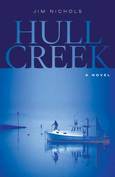
Nichols (author of Slow Monkeys) delivers a lively yarn about Maine lobstermen facing down times both hard and modern.
"Hull Creek is a devastating indictment of the forces that can and do ally to try to separate a hard-working Mainer from his multi-generational family home, but it's not a piece of message fiction. It's way beyond that; it's a great story..." --Nancy Griffin, The Free Press
"Hull Creek is a devastating indictment of the forces that can and do ally to try to separate a hard-working Mainer from his multi-generational family home, but it's not a piece of message fiction. It's way beyond that; it's a great story..." --Nancy Griffin, The Free Press
Well Out To Sea by Eva Murray

"If you're looking for a rabid, swashbuckling tell-all account of maritime outlaws or cut-throat lobstermen, you won't be very impressed. Yes, a rough side of this community exists, but in order to live here happily, I avoid cultivating fear. The same boys who might sprinkle roofing nails in a man's driveway, if they get mad enough, will rush to the same fellow's aid when he's in real danger, and that's the truth." Eva Murray
Bootleggers, Lobstermen & Lumberjacks: Fifty of the Grittiest Moments in the History of Hanrdscrabble New England by Matthew P. Mayo
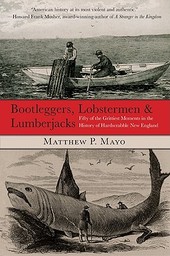
The story of New England is built on an endless armature of fascinating tales of Yankee ingenuity and intrepid characters, and this book brings together the top fifty wildest among them -- shipwreck victims surviving any way they could; Indian, pirate, and shark attacks; cougar and bear attacks; and, of course, rum runners and bootleggers doing what they do best.
The Lobster Gangs of Maine by James M. Acheson
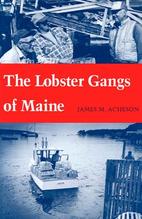
Following a general discussion and history of the fishery, the author moves into a discussion of kinship and community-the relationships and interactions between the citizens and their local towns and the problems of "outsiders" in moving into and integrating into the established community.
"The book is wonderfully entertaining, and the information it contained agreed with everything I have learned during a decade of summers on the Maine coast"--Wall Street Journal
"The book is wonderfully entertaining, and the information it contained agreed with everything I have learned during a decade of summers on the Maine coast"--Wall Street Journal
August 31--Jackson Memorial Library Tenant's Harbor, 7 PM

Rockland — Author K. Stephens will present a multimedia program titled Between Fact and Fiction: The Subculture of Maine Lobstermen Wednesday, Aug. 31 at 7:00 p.m. at the Jackson Memorial Library in Tenant's Harbor.
Stephens will stage an engaging presentation from her 2009 novel "The Ghost Trap," which follows the haunting story of Jamie Eugley, a young lobsterman struggling with the grinding responsibilities of a head-injured fiancée and mounting trap wars in a fictional setting based around Tenants Harbor, Spruce Head, Port Clyde and Friendship. "The Ghost Trap" is a modern tale with an old-fashioned hero who puts family and heritage before self.
Stephens, a long-term Midcoast resident, spent eight years researching and writing the background for the novel with James Acheson, author of "The Lobster Gangs of Maine," and several lobstermen, including "Survivor" contestant Zoe Zanidakis, serving as consultants on its accuracy. Featured on MPBN’s “Maine Things Considered” and Time Warner Cable’s “Maine Street,” "The Ghost Trap" has received multiple awards and Publishers Weekly calls it "A rugged and tender tale."
Stephens has teamed up with fourth-generation Maine lobsterman Ryan Post, creator of the educational DVD "Maine Buggin" that gives the inside scoop on how lobster traps work, how they are caught and how invisible territory lines are drawn. Stephens will splice fictional excerpts with documentary-style video clips for a fast, exciting presentation for those interested in the hard-working lifestyle that goes with Maine lobster fishing.
Stephens will stage an engaging presentation from her 2009 novel "The Ghost Trap," which follows the haunting story of Jamie Eugley, a young lobsterman struggling with the grinding responsibilities of a head-injured fiancée and mounting trap wars in a fictional setting based around Tenants Harbor, Spruce Head, Port Clyde and Friendship. "The Ghost Trap" is a modern tale with an old-fashioned hero who puts family and heritage before self.
Stephens, a long-term Midcoast resident, spent eight years researching and writing the background for the novel with James Acheson, author of "The Lobster Gangs of Maine," and several lobstermen, including "Survivor" contestant Zoe Zanidakis, serving as consultants on its accuracy. Featured on MPBN’s “Maine Things Considered” and Time Warner Cable’s “Maine Street,” "The Ghost Trap" has received multiple awards and Publishers Weekly calls it "A rugged and tender tale."
Stephens has teamed up with fourth-generation Maine lobsterman Ryan Post, creator of the educational DVD "Maine Buggin" that gives the inside scoop on how lobster traps work, how they are caught and how invisible territory lines are drawn. Stephens will splice fictional excerpts with documentary-style video clips for a fast, exciting presentation for those interested in the hard-working lifestyle that goes with Maine lobster fishing.
And summer has started....

62 book orders just came in from Boothbay Harbor, Camden, Freeport, and Bar Harbor. That's a lot to come in all at once. I'm thinking this has got to be my #1 champion bookstore in Maine, Sherman's Books and Stationery!
Sample Q & A from Goodreads Book Club on The Ghost Trap
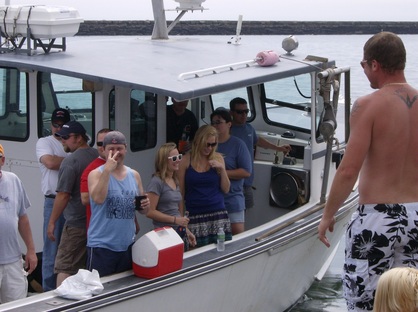
Life on a lobster boat
The following is some back and forth discussion on The Ghost Trap, the characters and Maine itself from the Goodreads book club in April. 2011.
Donna wrote: "I am really enjoying the sound of the books. The voices are real and true and they are the things that regular (?) people sound like. Of course I love Jamie and I love how he is different but still the same. Does that make sense???"
Krystal wrote: Nah. Totally makes sense. That's one of the things I like about the book, along with the whole gritty feel of the countryside and lobstering community.
Someone mentioned the whole Jamie/Anja relationship thing, and how sometimes Jamie's reactions to Anja aren't always exactly civil or something. I totally agree with K here. That's just real. I've got a cousin in her early twenties who cares for her ailing mother 24/7. To say it's hard work is an understatement. And it's natural for that kind of stress to cause people to lash out or say unkind things.
Anyway. I'm not that incredibly far into the book, but I'm making my way through. It's not my usual read, but I am enjoying it.
Erica wrote: I really like your perspective. I think this is why I enjoy this book so much; the relationships are so complicated. I think this added to what others have said earlier. I do enjoy that this novel does allow for male sympathy and doesn't just bash Jamie.
K wrote: I was told by my publisher she didn't even realize I was female until after they'd accepted the manuscript--they thought this book had been written by a man. To some degree, with the material and characters I was working with, I took this as a compliment. Not because I think men make better writers than women, but because as a female, I didn't want to get stereotyped with any "man-bashing" or overly emotional scenes. If lobstermen were going to read this (and many have) I wanted them to feel that these characters were real, were flawed and yet, people they could identify with. As it turns out, half my readership on this novel has been men. And I've been told, "I feel like these guys are one of us, like they could be living and working in this community." On the other hand, I've learned along the way, with women being the primary reading audience in the U.S, many editors just don't want an overly male-driven plot and/or characters. So with Anja's situation and with a few strong female characters (Donna, Carolyn, Happy), I tried to strike an even balance.
Nina wrote: How did you get involved in the lobstering community and how did the research process work?
K wrote: Short answer: "With extreme diplomacy." Having moved here "from away" in the mid 1990s (that's Maine-speak for someone whose grandparents weren't born here) I found myself in a quaint little harbor town eager to scratch the surface of what the Chamber of Commerce brochures were marketing. In other words, the romantic Maine, the kind of place you might see portrayed in chicklit novels about "escaping it all and moving to a Maine island," was not entirely my experience here. Well, sort of. Let's say some of the time it was. But at my favorite watering hole, I came into contact with a much more interesting archetype: the Maine fisherman. Usually, this type of guy was unshaven, boisterously cheerful and full of hell or quiet, reserved and full of life-altering stories on the water. So as I say in my bio, "after a beer or three" I got to be friends with a few of them. And because I was a journalism major, all I ever did is ask questions. At the time I was starting to formulate a loose plot (around 2000)-- no one else had really written about this subject in a fictional setting, except for "Eat, Pray, Love" author, Elizabeth Gilbert, who'd written her own version of trap wars in the compelling novel Stern Men. Apparently Gilbert (who wasn't from Maine) had hired Mainers to take her to an island so she could interview people for her book, according to those I've talked to who served as her "ambassador." Even though I had friends in the business, this wasn't a community that wanted to just hang their business out for all to see! Maine lobstering communities are notoriously TIGHT and similar to the Amish in that they have interacted as a subculture within the overall mainstream community for centuries. On the water, they serve as their own police, more often than not, and are well regarded for their ethical and sustainable fishing practices created a couple of hundred ago. So with extreme diplomacy, I researched and recorded everything I could get my hands on for about 8 years (newspaper articles, books, personal accounts, etc.) and promised those who told me true stories about illegal and underground wars they personally witnessed or experienced that I wouldn't use real names, dates or identifiable situations. You will see on my website's blog "Inside The Lobstering Life" there's an email from one such lobsterman who, on the condition of anonymity, gave me the tactics, the motivations and the archetypes of the "players"--which became the backbone of main characters Jamie Eugley, his father, James, Jamie's best friend, Thongchai and the community "Godfather" --Don Thatcher.
So, that's really how the structural part of the novel came together (the truly most difficult part--I won't lie--I had no interest in knowing how a lobster trap winch/hauler worked--but so I didn't sound like an IDIOT, I researched the hell out of it). After the novel was published, I was told I didn't get the exact elements of the cribbage scene right but hey, I'll live.
You can see more of the online discussion here.
Donna wrote: "I am really enjoying the sound of the books. The voices are real and true and they are the things that regular (?) people sound like. Of course I love Jamie and I love how he is different but still the same. Does that make sense???"
Krystal wrote: Nah. Totally makes sense. That's one of the things I like about the book, along with the whole gritty feel of the countryside and lobstering community.
Someone mentioned the whole Jamie/Anja relationship thing, and how sometimes Jamie's reactions to Anja aren't always exactly civil or something. I totally agree with K here. That's just real. I've got a cousin in her early twenties who cares for her ailing mother 24/7. To say it's hard work is an understatement. And it's natural for that kind of stress to cause people to lash out or say unkind things.
Anyway. I'm not that incredibly far into the book, but I'm making my way through. It's not my usual read, but I am enjoying it.
Erica wrote: I really like your perspective. I think this is why I enjoy this book so much; the relationships are so complicated. I think this added to what others have said earlier. I do enjoy that this novel does allow for male sympathy and doesn't just bash Jamie.
K wrote: I was told by my publisher she didn't even realize I was female until after they'd accepted the manuscript--they thought this book had been written by a man. To some degree, with the material and characters I was working with, I took this as a compliment. Not because I think men make better writers than women, but because as a female, I didn't want to get stereotyped with any "man-bashing" or overly emotional scenes. If lobstermen were going to read this (and many have) I wanted them to feel that these characters were real, were flawed and yet, people they could identify with. As it turns out, half my readership on this novel has been men. And I've been told, "I feel like these guys are one of us, like they could be living and working in this community." On the other hand, I've learned along the way, with women being the primary reading audience in the U.S, many editors just don't want an overly male-driven plot and/or characters. So with Anja's situation and with a few strong female characters (Donna, Carolyn, Happy), I tried to strike an even balance.
Nina wrote: How did you get involved in the lobstering community and how did the research process work?
K wrote: Short answer: "With extreme diplomacy." Having moved here "from away" in the mid 1990s (that's Maine-speak for someone whose grandparents weren't born here) I found myself in a quaint little harbor town eager to scratch the surface of what the Chamber of Commerce brochures were marketing. In other words, the romantic Maine, the kind of place you might see portrayed in chicklit novels about "escaping it all and moving to a Maine island," was not entirely my experience here. Well, sort of. Let's say some of the time it was. But at my favorite watering hole, I came into contact with a much more interesting archetype: the Maine fisherman. Usually, this type of guy was unshaven, boisterously cheerful and full of hell or quiet, reserved and full of life-altering stories on the water. So as I say in my bio, "after a beer or three" I got to be friends with a few of them. And because I was a journalism major, all I ever did is ask questions. At the time I was starting to formulate a loose plot (around 2000)-- no one else had really written about this subject in a fictional setting, except for "Eat, Pray, Love" author, Elizabeth Gilbert, who'd written her own version of trap wars in the compelling novel Stern Men. Apparently Gilbert (who wasn't from Maine) had hired Mainers to take her to an island so she could interview people for her book, according to those I've talked to who served as her "ambassador." Even though I had friends in the business, this wasn't a community that wanted to just hang their business out for all to see! Maine lobstering communities are notoriously TIGHT and similar to the Amish in that they have interacted as a subculture within the overall mainstream community for centuries. On the water, they serve as their own police, more often than not, and are well regarded for their ethical and sustainable fishing practices created a couple of hundred ago. So with extreme diplomacy, I researched and recorded everything I could get my hands on for about 8 years (newspaper articles, books, personal accounts, etc.) and promised those who told me true stories about illegal and underground wars they personally witnessed or experienced that I wouldn't use real names, dates or identifiable situations. You will see on my website's blog "Inside The Lobstering Life" there's an email from one such lobsterman who, on the condition of anonymity, gave me the tactics, the motivations and the archetypes of the "players"--which became the backbone of main characters Jamie Eugley, his father, James, Jamie's best friend, Thongchai and the community "Godfather" --Don Thatcher.
So, that's really how the structural part of the novel came together (the truly most difficult part--I won't lie--I had no interest in knowing how a lobster trap winch/hauler worked--but so I didn't sound like an IDIOT, I researched the hell out of it). After the novel was published, I was told I didn't get the exact elements of the cribbage scene right but hey, I'll live.
You can see more of the online discussion here.
Ask a Lobsterman
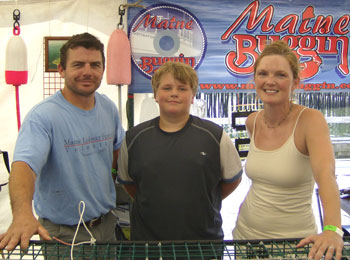
A lobsterman and his beautiful sternman
If you've read the book or are interested in reading it, you'll find (as I did) that the subculture of lobstering is fascinating--not just the day to day lifestyle of never having to clock in, but the ways the people in the tight-knit communities view the world. Here's your chance to ask a lobsterman a question during the month of April as The Ghost Trap is featured on Goodreads.com
The best fan letter I've ever gotten
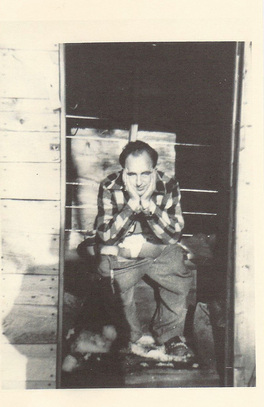
Hal Learnard, who you might remember as the winner of the "Best Maine Expressions" contest (see his entry here) received his complimentary copy of The Ghost Trap. This is the card I got in the mail Saturday.
"Hey K.
As soon as I saw this card I knew exactly who I had to send it to. I enjoyed your book a great deal. I must admit, I was hoping for a "happily ever after" ending but that wouldn't be reality. After spending a couple of summers on 700 Acre Island, I know your character descriptions were right on the money. Again, really enjoyed the book and am anxiously awaiting your next one! Best of luck, Hal
PS I can offer one piece of critique. In cribbage, only five cards are dealt when playing four-handed.
PPS The picture shows what happens when you don't turn the button.
"Hey K.
As soon as I saw this card I knew exactly who I had to send it to. I enjoyed your book a great deal. I must admit, I was hoping for a "happily ever after" ending but that wouldn't be reality. After spending a couple of summers on 700 Acre Island, I know your character descriptions were right on the money. Again, really enjoyed the book and am anxiously awaiting your next one! Best of luck, Hal
PS I can offer one piece of critique. In cribbage, only five cards are dealt when playing four-handed.
PPS The picture shows what happens when you don't turn the button.
How to have fun on a book tour
A glimpse into a year of taking The Ghost Trap and Maine Buggin on the road in Maine. Yeah, I'd do it all over again.
|
|
Discovery Channel Came To Rockland to Film The Lobster Trap Tree
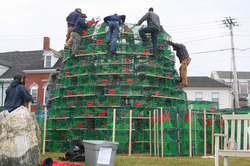
photo and story: Daniel Dunkle, Village Soup
Setting up this particular tree is so not the way my grandfather used to MacGyver our artificial tree on a couple of scotches and a cigar two days before Christmas.
The Discovery Channel sailed into Rockland Friday, Nov. 19 to film the building of the Lobster Trap Christmas Tree--an annual fixture in Rockland's holiday celebrations since 2003. Usually 15 to 30 volunteers help in the construction of the tree including helpers from the business community, Atlantic Challenge and the U.S. Coast Guard.The official tree lighting ceremony will still be held Friday, Nov. 26 at 6 p.m. The special is expected to air on The Learning Channel.
Click to read the full story.
The Discovery Channel sailed into Rockland Friday, Nov. 19 to film the building of the Lobster Trap Christmas Tree--an annual fixture in Rockland's holiday celebrations since 2003. Usually 15 to 30 volunteers help in the construction of the tree including helpers from the business community, Atlantic Challenge and the U.S. Coast Guard.The official tree lighting ceremony will still be held Friday, Nov. 26 at 6 p.m. The special is expected to air on The Learning Channel.
Click to read the full story.
Ghosts on the Coast
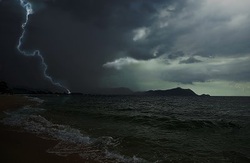
Among Maine fishermen there are legends of spectres, particularly the story of The Hascall, as told in The Ghost Trap.
To read more of the legend of the ghostly Hascall
To read more of the legend of the ghostly Hascall
The Ghost Trap's latest review

This one, from
D. Cloyce Smith (Brooklyn, NY)
on Amazon, nails the elements of the novel.
Burdened by the hard knocks of life in a Maine town populated by families who have been in the lobstering trade for several generations, Jamie Eugley is a man with a good heart and an explosive temper. He so wants to do the right thing, but as often as not, he can shatter his best intentions with an outburst that results almost immediately in regrets and repercussions. He lives with the worries of his hand-to-mouth business and the oppressive responsibilities of caring for Anja, a former girlfriend who has been seriously incapacitated by a head trauma (the cause of which is unveiled some way into the book) and whom he has sworn never to abandon. His lifelong friends bring him amusement and loyalty tinged with occasional embarrassment. He has almost surrendered to the tyrannical drudgery of his so-called life when he meets a bohemian, tomboyish hippie chick named (of all things) Happy.
At times, Jamie reminds me of a character from a Halldor Laxness novel--a faintly loutish but likable hero intrigued by the cosmopolitan world outside his small-town surroundings yet aware that he could never be a part of it. When he goes to the rich-kids rave at which he meets Happy, he is surprised that they are "sociable and accepting, even of him in his blue work shirt," yet he realizes that it "wouldn't be the other way around." A few years earlier, he had even attempted an escape that brought him to the Portland on America's other coast, but it didn't take him long to realize he will always be a modern-day yeoman and, discouraged and broke, he returned home. Yet that longing for something different sets him apart from his friends--his dalliance with Happy only rekindles the hunger--and it's this conflict between the world of realities and the world of possibilities that will result in tragedy and, ultimately, his redemption. Jamie isn't just a lobsterman, he's Everyman who has ever wanted to be more than he is.
"The Ghost Trap" is not just a good read, it is an excellent novel--and I'm almost ready to proclaim it as the best work of contemporary fiction that I've read this year. (It's certainly the best debut.) Stephens's knack for plotting is enhanced by her ear for impeccable dialogue (both local and urban) and by authentic interior monologue: her portrayal of Happy is so dead-on that I felt like I knew her, and some passages simply awed me with their lyrical precision. There are as many hilarious moments as poignant ones--yet the novel never once stoops to sentimentality. And there's enough of a plot--involving a mystery set off by decades-long territorial feuds between lobstermen--to satisfy the reader expecting more than a character study. Stephens has given her deeply flawed saint a life worth examining.
D. Cloyce Smith (Brooklyn, NY)
on Amazon, nails the elements of the novel.
Burdened by the hard knocks of life in a Maine town populated by families who have been in the lobstering trade for several generations, Jamie Eugley is a man with a good heart and an explosive temper. He so wants to do the right thing, but as often as not, he can shatter his best intentions with an outburst that results almost immediately in regrets and repercussions. He lives with the worries of his hand-to-mouth business and the oppressive responsibilities of caring for Anja, a former girlfriend who has been seriously incapacitated by a head trauma (the cause of which is unveiled some way into the book) and whom he has sworn never to abandon. His lifelong friends bring him amusement and loyalty tinged with occasional embarrassment. He has almost surrendered to the tyrannical drudgery of his so-called life when he meets a bohemian, tomboyish hippie chick named (of all things) Happy.
At times, Jamie reminds me of a character from a Halldor Laxness novel--a faintly loutish but likable hero intrigued by the cosmopolitan world outside his small-town surroundings yet aware that he could never be a part of it. When he goes to the rich-kids rave at which he meets Happy, he is surprised that they are "sociable and accepting, even of him in his blue work shirt," yet he realizes that it "wouldn't be the other way around." A few years earlier, he had even attempted an escape that brought him to the Portland on America's other coast, but it didn't take him long to realize he will always be a modern-day yeoman and, discouraged and broke, he returned home. Yet that longing for something different sets him apart from his friends--his dalliance with Happy only rekindles the hunger--and it's this conflict between the world of realities and the world of possibilities that will result in tragedy and, ultimately, his redemption. Jamie isn't just a lobsterman, he's Everyman who has ever wanted to be more than he is.
"The Ghost Trap" is not just a good read, it is an excellent novel--and I'm almost ready to proclaim it as the best work of contemporary fiction that I've read this year. (It's certainly the best debut.) Stephens's knack for plotting is enhanced by her ear for impeccable dialogue (both local and urban) and by authentic interior monologue: her portrayal of Happy is so dead-on that I felt like I knew her, and some passages simply awed me with their lyrical precision. There are as many hilarious moments as poignant ones--yet the novel never once stoops to sentimentality. And there's enough of a plot--involving a mystery set off by decades-long territorial feuds between lobstermen--to satisfy the reader expecting more than a character study. Stephens has given her deeply flawed saint a life worth examining.
Look for us on Time Warner Cable this summer!

Post, Stephens and Host Mike Edgecomb
Here's 4th generation lobsterman Ryan Post and I taping a couple of segments for Time Warner Cable's "Maine Street"broadcast talking about Maine Buggin andThe Ghost Trap. Thanks to our great host, Mike Edgecomb for an easy interview. Here's a preview of what to expect. Watch for us on July 29 at 7:30 pm and on July 31 and August 1 at 1 pm! (Channel 9) Let us know what you thought.
Maine lobster wars simmering a year after shooting
By CLARKE CANFIELD, Business Week
MATINICUS ISLAND, Maine
A year after an island feud among lobstermen erupted in gunfire, one of the two lobstermen on the receiving end of island justice is speaking out against a mainland jury's decision to acquit the fellow lobsterman who fired a near-fatal shot.
Weston Ames said he remembers a bullet whistling by his head during a confrontation with Vance Bunker, a 69-year-old longtime lobsterman on Matinicus Island. His stepbrother, Christopher Young, 42, wasn't so lucky. The second bullet hit him in the neck, leaving him with lingering health problems.
"The truth of it is, he tried to kill two of us - for no reason," said Ames, 44, standing on the very spot on the Steamboat Wharf where the confrontation took place.
For more on this story...
MATINICUS ISLAND, Maine
A year after an island feud among lobstermen erupted in gunfire, one of the two lobstermen on the receiving end of island justice is speaking out against a mainland jury's decision to acquit the fellow lobsterman who fired a near-fatal shot.
Weston Ames said he remembers a bullet whistling by his head during a confrontation with Vance Bunker, a 69-year-old longtime lobsterman on Matinicus Island. His stepbrother, Christopher Young, 42, wasn't so lucky. The second bullet hit him in the neck, leaving him with lingering health problems.
"The truth of it is, he tried to kill two of us - for no reason," said Ames, 44, standing on the very spot on the Steamboat Wharf where the confrontation took place.
For more on this story...
Maine Lobster Industry Still Hurting
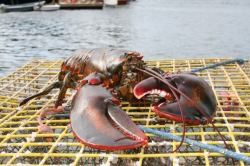
photo: Dale Landrith
by Sandra Dinsmore, The Working Waterfront
It's been a lose-lose situation for lobster fishermen and dealers this spring. The low $3.25 per lb. boat price (the price paid to fishermen) for superb hard shell lobster this spring left both worried about how low the price might drop when shedders come on the market. By mid-June lobster was in short supply as the animals hid to protect themselves from predators while shedding hard old shells and waiting for soft new ones to harden.
For fishermen low prices for low catches meant more lean paychecks. For dealers it meant coping with increasingly smaller margins (what they make on what they sell rather than the number of lbs. sold.). Reports from Gloucester, Mass. confirmed Maine fishermen's and dealers' fears: buyers had gone on a split boat price: for hard shell, $4.50 per lb.; for shedders $2.50 per lb.
"There's no way we can make it at that price," said veteran Stonington fisherman Mike Shepard. "It hasn't been sustainable all spring, even at $3.25 per lb. If you're lucky, you're maybe breaking even. You really have to make $5 per lb., so much goes back into expenses."
To read the rest of the story, please go to: The Working Waterfront.
It's been a lose-lose situation for lobster fishermen and dealers this spring. The low $3.25 per lb. boat price (the price paid to fishermen) for superb hard shell lobster this spring left both worried about how low the price might drop when shedders come on the market. By mid-June lobster was in short supply as the animals hid to protect themselves from predators while shedding hard old shells and waiting for soft new ones to harden.
For fishermen low prices for low catches meant more lean paychecks. For dealers it meant coping with increasingly smaller margins (what they make on what they sell rather than the number of lbs. sold.). Reports from Gloucester, Mass. confirmed Maine fishermen's and dealers' fears: buyers had gone on a split boat price: for hard shell, $4.50 per lb.; for shedders $2.50 per lb.
"There's no way we can make it at that price," said veteran Stonington fisherman Mike Shepard. "It hasn't been sustainable all spring, even at $3.25 per lb. If you're lucky, you're maybe breaking even. You really have to make $5 per lb., so much goes back into expenses."
To read the rest of the story, please go to: The Working Waterfront.
Ladies Book Club Fave (Minus The "Bad" Language)

A friend of mine passed the novel onto his mother's "Alexandria Book Club," which is the third ladies' book club I'm aware of who took a chance on reading it (as a departure from their usual fare) and loved it. Their review:
Please report to K. that my group of old ladies loved the book! Some had a bit of trouble getting by some of the language in the beginning, but once they understood the context, they went with it and were so glad to have read it! They really found the characters authentic; loved many, detested a few! They also were so impressed by K's seeming inside knowledge of the lobstermen (and men at large) and their lives, plus her understanding of a brain injury and its devastating toll. The scene at the convenience store, when Anja was trying to return to some form of work, from choosing her clothes to the final horror, deeply touched everyone. There were many scenes that were recalled with real appreciation. In all, they thought it was artfully written and as I said were so glad you gave it to me. They all said they will share it with others too. So, please tell K. they loved The Ghost Trap ( the book and the title) and are looking forward to her next offering!
Note to Book Clubs: Contact me personally if you would like to do a virtual (Skype) author visit for your next book club featuring The Ghost Trap.
Please report to K. that my group of old ladies loved the book! Some had a bit of trouble getting by some of the language in the beginning, but once they understood the context, they went with it and were so glad to have read it! They really found the characters authentic; loved many, detested a few! They also were so impressed by K's seeming inside knowledge of the lobstermen (and men at large) and their lives, plus her understanding of a brain injury and its devastating toll. The scene at the convenience store, when Anja was trying to return to some form of work, from choosing her clothes to the final horror, deeply touched everyone. There were many scenes that were recalled with real appreciation. In all, they thought it was artfully written and as I said were so glad you gave it to me. They all said they will share it with others too. So, please tell K. they loved The Ghost Trap ( the book and the title) and are looking forward to her next offering!
Note to Book Clubs: Contact me personally if you would like to do a virtual (Skype) author visit for your next book club featuring The Ghost Trap.
How One Email Influenced The Plot Of The Ghost Trap
The origins of The Ghost Trap
April 24, 2010
In researching this novel, I interviewed probably a half dozen lobstermen. It wasn't an easy task. You don't just go up to a lobster fishermen and say, "Tell me all about your family history, your island or territory alliances and long-standing feuds. Oh and by the way, have you ever been in a trap war?" Having lived in Midcoast Maine since the early '90s, I knew several people who lobster fished for a living. They were willing to sit down with me and reveal privileged information that usually stayed within the confines of a small harbor community. Other times, I was allowed to tag along to hang out at a Fish House, usually a ramshackle boat barn with guys who sat around holding coffee cups full of rum, oblivious to the slurping sounds of water against the pilings. Before we entered this Fish House, I was told: "No notebooks, no tape recorders, nothin'."
On more than one occasion, those who were willing to share confidential stories about trap wars made me promise to change the names and dates and even locations of certain wars. When boats get sunk, houses get torched, truck tires slashed, and other territorial violence occurs, you pay attention to what you're told. As stated elsewhere in my blog--don't get the mistaken impression that major trap wars happen all the time--at least they hadn't in the near decade that I'd been writing this book. But they do happen. They can get very ugly.
The research extended to more than just lobstermen. I kept about five notebooks, filling them up with story fragments, definitions and diagrams, conversations, extensive research on traumatic brain injuries, notes on my day trips on three-masted schooners, scribbles on every type of boat and bait, every fluctuation of weather, tides and seas, from oily to flat-ass calm.
If you've read The Ghost Trap or if you are going to, I'd like to thank the lobsterman who provided the essential primer to lobster warfare in the email dated 2002 above.
In researching this novel, I interviewed probably a half dozen lobstermen. It wasn't an easy task. You don't just go up to a lobster fishermen and say, "Tell me all about your family history, your island or territory alliances and long-standing feuds. Oh and by the way, have you ever been in a trap war?" Having lived in Midcoast Maine since the early '90s, I knew several people who lobster fished for a living. They were willing to sit down with me and reveal privileged information that usually stayed within the confines of a small harbor community. Other times, I was allowed to tag along to hang out at a Fish House, usually a ramshackle boat barn with guys who sat around holding coffee cups full of rum, oblivious to the slurping sounds of water against the pilings. Before we entered this Fish House, I was told: "No notebooks, no tape recorders, nothin'."
On more than one occasion, those who were willing to share confidential stories about trap wars made me promise to change the names and dates and even locations of certain wars. When boats get sunk, houses get torched, truck tires slashed, and other territorial violence occurs, you pay attention to what you're told. As stated elsewhere in my blog--don't get the mistaken impression that major trap wars happen all the time--at least they hadn't in the near decade that I'd been writing this book. But they do happen. They can get very ugly.
The research extended to more than just lobstermen. I kept about five notebooks, filling them up with story fragments, definitions and diagrams, conversations, extensive research on traumatic brain injuries, notes on my day trips on three-masted schooners, scribbles on every type of boat and bait, every fluctuation of weather, tides and seas, from oily to flat-ass calm.
If you've read The Ghost Trap or if you are going to, I'd like to thank the lobsterman who provided the essential primer to lobster warfare in the email dated 2002 above.
Maine Cleans Up Its Ghost Traps
The Real Question: Has There Been Fair or Foul Play?
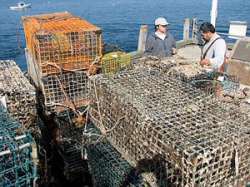
photo: Bangor Daily News
April 16, 2010
Ghost Traps are lobster traps that have been cut off from their buoys at the surface of the ocean, where they sink to the bottom of the sea, trapping lobsters in a watery grave and generally littering up the ocean floor. With a trap recovery program being conducted by the Gulf of Maine Lobster Foundation, hundreds have been pulled up around Mt. Desert Island.
"Some of the traps looked almost brand-new, others were nearly crusted over with barnacles, and a few had lobster buoys inside them, placed there by other fishermen who cut the traps on purpose and didn’t want the buoys to be found."
This may look like a bunch of hulking rusted metal to most people, but I think of it as marine CSI. How many have been cut off by innocent or inadvertent means (the weather, boat propeller cuts)? And how many have been cut illegally in the dead of night, precluding some trap war, hmmmmm?
Ghost Traps are lobster traps that have been cut off from their buoys at the surface of the ocean, where they sink to the bottom of the sea, trapping lobsters in a watery grave and generally littering up the ocean floor. With a trap recovery program being conducted by the Gulf of Maine Lobster Foundation, hundreds have been pulled up around Mt. Desert Island.
"Some of the traps looked almost brand-new, others were nearly crusted over with barnacles, and a few had lobster buoys inside them, placed there by other fishermen who cut the traps on purpose and didn’t want the buoys to be found."
This may look like a bunch of hulking rusted metal to most people, but I think of it as marine CSI. How many have been cut off by innocent or inadvertent means (the weather, boat propeller cuts)? And how many have been cut illegally in the dead of night, precluding some trap war, hmmmmm?
Debut novel is convincing to the end
Review from The Morning Sentinel
April 4, 2010
Fiction about Maine lobstering and life on the working waterfront is usually coarse, profane and gritty, and THE GHOST TRAP is no different but for one exception. This sensitive and dramatic story is notable for its convincing humanity. THE GHOST TRAP is the powerful debut novel of Maine writer K. Stephens, a woman whose published articles have covered schooners, food, wine, teenagers and Maine personalities. Here she debunks the tourists' romantic image of Maine fishermen, revealing the hard work of lobstering, the strict, unwritten codes of territoriality and conflict resolution, disintegrating traditions, violence, alcohol and drug abuse and economic despair. Jamie Eugley is a 27-year-old third- generation lobsterman from Petit Point on Penobscot Bay, struggling to make boat and truck payments while also caring for his brain-damaged girlfriend, Anja. She was injured while fishing with him, and the weight of Jamie's guilt is wearing him down. As if he doesn't have enough to worry about, arrogant yachties are poaching lobsters, the foul-mouthed, violent and drug-dealing Fogartys are about to start a trap war, and a newcomer ignores all the local customs and fishes in Jamie's territory. Jamie does his best to help Anja with her slow recovery, but she is nearly helpless, entirely dependent on him for everything, a heavy burden indeed. But then Jamie meets Happy, a carefree girl working on a summertime schooner. He likes her because "You make my drinking look like it's not a problem," and he knows that only bad things can result from this quirky relationship. Stephens is a masterful storyteller, smartly blending her vividly descriptive narrative with action, suspense, a haunting atmosphere and very clever, bawdy and colorful dialogue. The conclusion is believable and strangely satisfying, with a few plot twists and a strong element of predictable sadness.
-- Bill Bushnell lives and writes in Harpswell.
Fiction about Maine lobstering and life on the working waterfront is usually coarse, profane and gritty, and THE GHOST TRAP is no different but for one exception. This sensitive and dramatic story is notable for its convincing humanity. THE GHOST TRAP is the powerful debut novel of Maine writer K. Stephens, a woman whose published articles have covered schooners, food, wine, teenagers and Maine personalities. Here she debunks the tourists' romantic image of Maine fishermen, revealing the hard work of lobstering, the strict, unwritten codes of territoriality and conflict resolution, disintegrating traditions, violence, alcohol and drug abuse and economic despair. Jamie Eugley is a 27-year-old third- generation lobsterman from Petit Point on Penobscot Bay, struggling to make boat and truck payments while also caring for his brain-damaged girlfriend, Anja. She was injured while fishing with him, and the weight of Jamie's guilt is wearing him down. As if he doesn't have enough to worry about, arrogant yachties are poaching lobsters, the foul-mouthed, violent and drug-dealing Fogartys are about to start a trap war, and a newcomer ignores all the local customs and fishes in Jamie's territory. Jamie does his best to help Anja with her slow recovery, but she is nearly helpless, entirely dependent on him for everything, a heavy burden indeed. But then Jamie meets Happy, a carefree girl working on a summertime schooner. He likes her because "You make my drinking look like it's not a problem," and he knows that only bad things can result from this quirky relationship. Stephens is a masterful storyteller, smartly blending her vividly descriptive narrative with action, suspense, a haunting atmosphere and very clever, bawdy and colorful dialogue. The conclusion is believable and strangely satisfying, with a few plot twists and a strong element of predictable sadness.
-- Bill Bushnell lives and writes in Harpswell.
35th Annual Fisherman's Forum
Every year I go to this thing. Why? Because lobsterman are a blast.

March 1, 2010
In writing The Ghost Trap, I used to bring my little notepad and just wander the Forum, hang out and listen to conversations, watch the lobsterman get all up in the DMR's face in the midst of talks and roundtables and just absorb it all. Several of the conversations in the novel have come directly from picking up lobster chatter at the Fisherman's Forum. One lobsterman sat with me for about two and half hours and told me all about the trap wars he'd known of, the tactics used and even the tools. You'll never look at a hockey stick the same way again.
In writing The Ghost Trap, I used to bring my little notepad and just wander the Forum, hang out and listen to conversations, watch the lobsterman get all up in the DMR's face in the midst of talks and roundtables and just absorb it all. Several of the conversations in the novel have come directly from picking up lobster chatter at the Fisherman's Forum. One lobsterman sat with me for about two and half hours and told me all about the trap wars he'd known of, the tactics used and even the tools. You'll never look at a hockey stick the same way again.
The best place to meet people? Duh. The bar.
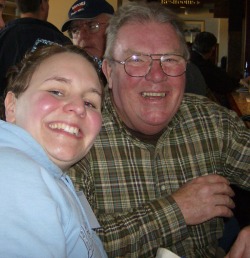
Meet Monique Coombs, author of a cookbook Lobsters On The Fly, a blogger and regular contributor to Maine Lobsterman Association's newsletter. Next to her is her good friend Brian. How do I describe Monique? A hurricane in a Bud Light bottle. She's married to a lobsterman out of Orr's Island, is passionate about the industry and knocks you flat with one-liners left and right. Clink--here's to you lady. By the way, I sincerely like the name of your cookbook. Look for Monique in the future as a guest blogger.
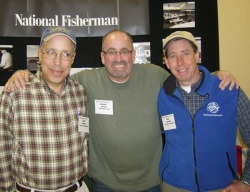
Just wanted to shout out hey to National Fisherman, (r to l) Jerry Fraser, Dennis Gears and Michael Lodato, who were manning the booth with great vigor. Nice guys. Loved the review The Ghost Trap got too--so thanks again National Fisherman!
